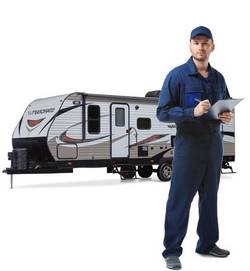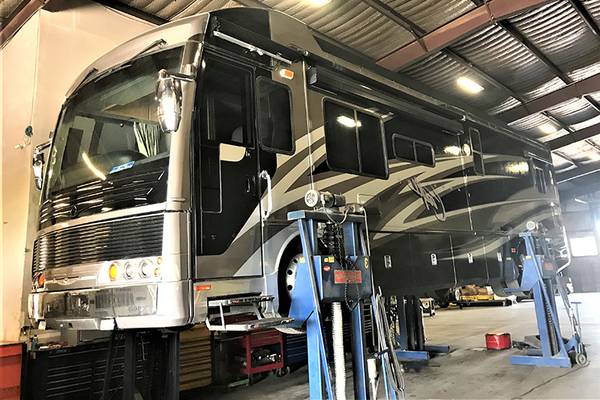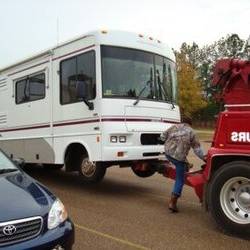

Just to make sure everything is okay, s tate and other government officials like to make sure vehicles are safe to operate and be on the road. That is the reasoning behind the different inspections RV owners have to go through in order to have their vehicles on the road when they want.
How To Find RV State Inspection Near Me: One of the best ways to find a state inspection site near you is Google Maps or nrvia.org/locate . Another option is to ask on any RV Forum. Most likely there will be a member or two near your location and can help you out.
If not, just contact your local RV dealer and they should have the information you need. To find out more about state inspections for RVs just continue to read our article. It is filled with the information you need so you can have your RV inspected correctly.
How To Find RV State Inspection 101
The good news is that your RV may not need an inspection. The bad news is that it will if you live in a state that requires RV inspections. In other words, your RV needs to be inspected only if you are registering it in a state that requires RV inspections.
There is more good news. If your RV is registered in a state that does not require RV inspections, then you do not have to get one when you enter a state that does require them.
You can camp for weeks, say in Texas, if your RV is licensed and registered in South Dakota. The former requires inspections if you register your RV there but the latter does not. So you are safe if you are from South Dakota or use a South Dakota address for your RV’s registration address.
Each state is going to be different. That is the major negative about living in a free country where individual states get to make their own laws and regulations. The only consistency you may get is that some states require RV inspections and others do not.
Then the other thing you can count on is that these rules will vary on the scale of relaxed to strict. For example, North Carolina will not issue a new license tag until the inspection is completed. You have 90 days before the expiry of your current tags to get the inspection done.
On the other hand, Texas says you need to get an inspection on a new RV and have 2 years before you have to get another one. After that initial 2-year period, the inspections come annually.
Also, be careful as it may not be a state requirement to have your RV inspected. Texas usually lets the different counties require that to be done and not all counties in the state require an RV inspection.
The best thing to do is check with your state’s motor vehicle office to see what is required for your RV.

There seems to be a variety of places that can conduct these inspections. Some say that the commercial truck inspection stations can do the deed and others say that they use the local repair shop to get it done.
There seems to be no hard and fast rule on who does the inspection. You can also get the inspection done at RV dealerships, their repair shops, and other places. Now there is a thing called a certified RV inspection which is conducted by the NRVIA.
This is just an inspection service to help you find out all the details of the RV you intend to buy. These inspectors are formally trained by the NRVIA and know what to look for and how to communicate what they have found. Appointments are needed to use this service.
In Canada, RVs, TTs and every recreational vehicle except for an ATV needs a yearly inspection. Canadian inspectors do not stop at checking taillights, turn signals and other surface checks. They go through the vehicle with a fine-tooth comb.
So check with your local state or RV dealer to find out who is approved to make the inspection for you. It may not be as intense as the NRVIA or the Canadian version and it may not cost you a lot of money to have done.
This is going to depend on who does the inspection and what is covered by that work. One non-state company only charges $12.50 for the inspection but that fee may not include an emissions check.
Our research did not uncover a lot of costs for state or county fees but we did uncover quite a few private costs if you want a thorough inspection done to your RV. To find out the cost in your area you need to contact your local DMV office or RV dealer.
They would tell you if an inspection is required for your RV or not and what the cost will be. For NRVIA, you are looking at paying between $500 to $800 approx . Other private inspection services can cost between $150 and $350 depending on what type of inspection you want to be done and where it is done.
Some good news, some people pay as little as $7 for their inspections but those prices have probably gone up since they were done. A lot will depend on if your RV registration address is in a big city or in a small little cow town. Cities tend to require more work to be done and you have to pay for that extra service.

Some inspections are for simple things like emissions and safety. When conducted by the state or county, or authorized by them, these inspections simply cover the basics of turn signals, headlights, brake lights, brakes, and your emissions system.
There are also private inspections that cover the whole RV inspecting items like appliances, heaters, slide outs and every feature and function of the RV. These are the ones that can really ding your pocketbook.
But they cover just about every nook and cranny on your prospective RV. To get a more detailed idea of what is involved, first check to see if your state or county requires an inspection or not.
Then ask them what is being inspected and how long it will take. The last word on Canada is that the fee is about $30 CDN, but that may be higher now, but the inspection covers everything including removing the wheels to check brakes and other wheel related parts.
What you have to watch out for is a dealer inspection on the RVs that they sell. They may charge you upwards of $700 and then when it rains, you have to go back and get another $500 worth of repairs done on issues the dealer supposedly missed.
Not all inspections are on the up and up so be careful where you go.
This is a requirement in at least 2 states that we know of. Texas and North Carolina. There may be more states that require inspections before they register your RV, TT or other recreational vehicle or trailer.
You have to call your state’s DMV office to find out for sure. While you are at it, you should ask how much the inspection costs, where it can be done and what is covered in the inspection. Get all the facts before you go in and register your RV, etc.
Also, there may be age exemptions as well. If you have an older RV, you may not be required to have an inspection. You should also ask your local DMV office about this issue. You may be lucky and not have to pay for an inspection if your RV is older than 20 or 25 years.
New York is another state that requires an inspection sticker before registration of the towable trailer. You need to carry that sticker in the tow vehicle at all times. Each state will have its own requirements for you to meet, so it is best to inquire before you buy.
This is not a mandatory duty. It is advisable and highly recommended one as sellers do not always tell the truth about their RV. One buyer did hire an NRVIA inspector to check out the vehicle before he or she paid any money.
The inspector found many issues with the vehicle and saw that the seller was not being honest. Getting an inspection before you buy is a good thing to do. It may cost some money upfront but save you a lot in the long run.
There are many companies out there that will do private inspections before the sale is complete. This is for your peace of mind but you should be aware that these inspections are not as cheap as the mandatory state or county inspections.
We have seen where some of the inspection fees can go as high as $1200. other companies’ fees are more reasonable and their cost will depend on what is inspected and how big or small the RV is.
As we said the cost of the private inspection may well be worth it as one inspector found where a seller covered up a crack in the street sidewall of an RV with a sport’s team sticker and it was not a small sticker. Here is the link to that inspection with pictures.
You will have to decide if a private pre-purchase inspection is worth it or not.

These will vary between the companies doing the inspection and what type of inspection you want done. The NRVIA, which started in 2014, has their standard uniform checklist which covers a lot of territory on your prospective RV.
They have their usual; Disclaimers and limitation warnings as well as an introduction to let you know what is covered and what is left out. You can view their full checklist at this link.
Another company can do a safety check only for $350 and it covers propane systems, leveling systems, king pin condition, VIN confirmation, check your holding tanks and a lot more.
They also offer a how to operate your RV inspection for $150. This task gives you the proper instructions on how to operate different features on your RV including slide outs. To see the checklist for both inspections just click here.
If you want to do your own inspection and save yourself some costs and other fees, here is a link to a downloadable and printable inspection form you can use. If you need tips on how to do your own inspection, then click this link.
That latter link provides you with all the tips and tricks you need to know about making sure your personal inspection is thorough and accurate. Then this link gives you both tips and a printable form to use.
Whether you hire someone or do it yourself, your inspections protect you from possible money pit traps that have you throwing more money at your newly purchased RV than you intended or expected.
While they can be a hassle and a pain in the neck, state inspections are a good thing. These inspections make sure your RV is fit for the road and makes sure you know what is going on with your vehicle.
Usually state or county inspections can be done just about anywhere that the government officials have authorized to conduct their inspections. You should not have to go too far out of your way to find a station that will do it for you for a nominal fee.
For pre-purchase inspections, these are up to you. You may not like the cost that comes with using these services but they may save you thousands of dollars after you purchase the vehicle or trailer.
Inspectors will find lots of hidden secrets that you may not think about looking at. So consider getting a private inspection before you buy a used RV .